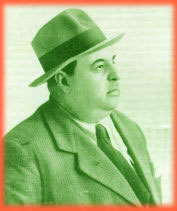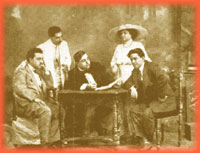|
 He
was the son of a philosopher who followed the
republican ideology and therefore decided to call
him Libero. His mother was a good piano-player.
Libero Bovio was born in Naples on the 8th june,
1883. He started university, attending the courses
of medicine. He did not graduate because of his
passion for theatre in Neapolitan dialect. When
he was just nineteen, he made his first play.
After his father dath, he was forced to find a
job that supports him. He first worked for a local
newspaper called " Don Marzio", the
he worked at the National Museum.. He became the
director of the Export Office. He was able therefore
to write a lot; he is the author of almost six
hundreds lyrics: most of them belong to the history
of the Neapolitan song thanks also to the talent
of good musicians who were able to match his texts
to the music (De Curtis, Valente, Nardella, Cannio,
Falvo)."Tarantella Luciana", "Guapparia".
He
was the son of a philosopher who followed the
republican ideology and therefore decided to call
him Libero. His mother was a good piano-player.
Libero Bovio was born in Naples on the 8th june,
1883. He started university, attending the courses
of medicine. He did not graduate because of his
passion for theatre in Neapolitan dialect. When
he was just nineteen, he made his first play.
After his father dath, he was forced to find a
job that supports him. He first worked for a local
newspaper called " Don Marzio", the
he worked at the National Museum.. He became the
director of the Export Office. He was able therefore
to write a lot; he is the author of almost six
hundreds lyrics: most of them belong to the history
of the Neapolitan song thanks also to the talent
of good musicians who were able to match his texts
to the music (De Curtis, Valente, Nardella, Cannio,
Falvo)."Tarantella Luciana", "Guapparia".
It
was clear he was a very talented man when he started
directing the storic music house "La Canzonetta".
Around 1915 he wrote "Tu ca nun chiagne",
"Reginella", "Cara piccina".
After the first world war, in 1919 he married
Maria Di Furia who gave him two sons. In spite
of his family engagements, he kept on writing
lyrics. He was able to write even while he was
relaxing on his cab, driven by his faithful coachman
Auciello (whose nickname was Dog's nose).
He
wrote also theatre works as "Gente nosta",
"'O prufessore", "'O Macchiettista"
and many more.
 "L'addio"
and "Totonno se ne va" are maybe prophetic
songs because soon he would leave "La canzonetta"
to go and work for the "Santa Lucia"
editions. This change let his song be characterized
by a more dramatist style. The songs made in this
period are: "'E pentite", "Lacreme
napulitane", "Carcere", "'E
figlie", "Zappatore". Then he also
wrote: "'O paese d''o sole" and "Signorinella". "L'addio"
and "Totonno se ne va" are maybe prophetic
songs because soon he would leave "La canzonetta"
to go and work for the "Santa Lucia"
editions. This change let his song be characterized
by a more dramatist style. The songs made in this
period are: "'E pentite", "Lacreme
napulitane", "Carcere", "'E
figlie", "Zappatore". Then he also
wrote: "'O paese d''o sole" and "Signorinella".
In
1934 he founded "La bottega" with other
big of the music as Tagliaferri, Valente and Lama.
He published the following songs: "Passione",
L'ultima tarantella" and "Chitarra nera".
Unfortunately
in 1941 he got ill and he died in may of that
year. He left an unfilling emptines.
|




 He
was the son of a philosopher who followed the
republican ideology and therefore decided to call
him Libero. His mother was a good piano-player.
Libero Bovio was born in Naples on the 8th june,
1883. He started university, attending the courses
of medicine. He did not graduate because of his
passion for theatre in Neapolitan dialect. When
he was just nineteen, he made his first play.
After his father dath, he was forced to find a
job that supports him. He first worked for a local
newspaper called " Don Marzio", the
he worked at the National Museum.. He became the
director of the Export Office. He was able therefore
to write a lot; he is the author of almost six
hundreds lyrics: most of them belong to the history
of the Neapolitan song thanks also to the talent
of good musicians who were able to match his texts
to the music (De Curtis, Valente, Nardella, Cannio,
Falvo)."Tarantella Luciana", "Guapparia".
He
was the son of a philosopher who followed the
republican ideology and therefore decided to call
him Libero. His mother was a good piano-player.
Libero Bovio was born in Naples on the 8th june,
1883. He started university, attending the courses
of medicine. He did not graduate because of his
passion for theatre in Neapolitan dialect. When
he was just nineteen, he made his first play.
After his father dath, he was forced to find a
job that supports him. He first worked for a local
newspaper called " Don Marzio", the
he worked at the National Museum.. He became the
director of the Export Office. He was able therefore
to write a lot; he is the author of almost six
hundreds lyrics: most of them belong to the history
of the Neapolitan song thanks also to the talent
of good musicians who were able to match his texts
to the music (De Curtis, Valente, Nardella, Cannio,
Falvo)."Tarantella Luciana", "Guapparia". "L'addio"
and "Totonno se ne va" are maybe prophetic
songs because soon he would leave "La canzonetta"
to go and work for the "Santa Lucia"
editions. This change let his song be characterized
by a more dramatist style. The songs made in this
period are: "'E pentite", "Lacreme
napulitane", "Carcere", "'E
figlie", "Zappatore". Then he also
wrote: "'O paese d''o sole" and "Signorinella".
"L'addio"
and "Totonno se ne va" are maybe prophetic
songs because soon he would leave "La canzonetta"
to go and work for the "Santa Lucia"
editions. This change let his song be characterized
by a more dramatist style. The songs made in this
period are: "'E pentite", "Lacreme
napulitane", "Carcere", "'E
figlie", "Zappatore". Then he also
wrote: "'O paese d''o sole" and "Signorinella".